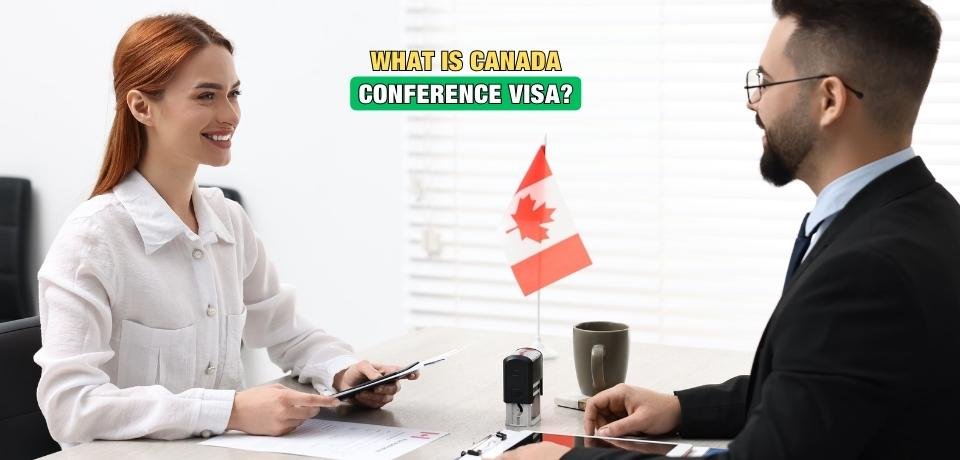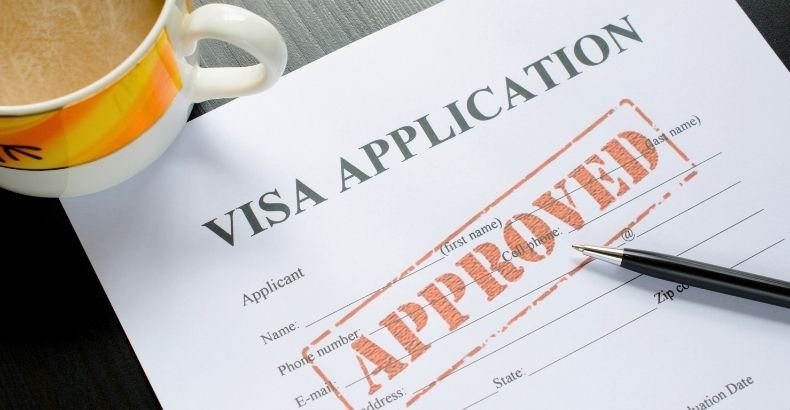Conferences in Canada have become hubs for international professionals and academics interested in expanding their networks and exploring fresh ideas across diverse industries. However, attending these events requires a few documents, and a Canada conference visa is one of them. Now you might ask: What is Canada Conference Visa?
A Canada conference visa is a temporary permit required for international visitors attending conferences in Canada. It confirms the purpose of travel, verifies backgrounds and ensures compliance with Canadian laws. This visa helps maintain event reliability, security, and order for attendees and hosts alike.
Curious about how to get through the application process or wondering about other essential details? This article covers everything you need to know, to make sure you’re well-prepared for your Canadian conference journey.
Canadian Conference: Why Should You Attend One?
Meeting professionals from a variety of fields is possible by attending a conference in Canada. These gatherings allow attendees to learn the latest trends, get valuable insights, and interact with skilled professionals. Conferences in Canada cover various sectors, making it a beneficial experience for everyone who attends.
One of the main reasons to attend conferences in Canada is to network. Professionals from across the globe come together to exchange ideas and create new partnerships. These connections can open doors for your career, inspire innovative thoughts, and expand your professional circle in ways you may never have expected.
Many Canadian conferences focus on specialized fields, such as the health care conference in Canada, which draws professionals eager to discuss recent advancements. These events provide direct exposure to expert-led sessions, offering fresh perspectives and new approaches. Attending one can lead to personal growth and deepen your understanding of crucial industry topics.
To attend a Canadian conference, you’ll need some essentials, such as proper identification, a conference visa, and proof of registration. Organizing these details ensures smooth entry, making it easier to focus on gaining the most from your experience. Canadian conferences are well-structured, creating a professional and inviting environment for every participant.
What is a Canada Conference Visa?
To ensure security, order, and appropriate authorization, a visa is required in order to attend a conference in Canada. This visa requirement safeguards both Canada’s interests and the visitor’s rights while maintaining a smooth conference experience. Here is more information about the Canadian conference visa

Confirms Purpose of Visit
When applying for a conference visa, travelers must specify their goals, such as going to a conference. This ensures that visitors are genuinely coming for conferences and not for unrelated activities. By verifying intentions, Canada can keep events focused and limit participation to legitimate attendees, creating a secure and professional environment for everyone involved.
Ensures Legal Compliance for International Visitors
A conference visa allows visitors to meet Canada’s legal entry requirements. Countries have strict immigration rules, and a visa helps applicants prove their purpose and readiness to respect Canadian laws. Without this, authorities might deny entry, impacting the conference’s international involvement.
Protects National Health and Safety
International visitors’ conference visa applications allow Canada to conduct health and safety checks. This process helps prevent health risks from spreading, especially at large gatherings. By requiring all attendees to meet health standards, Canada can ensure that conferences remain safe and healthy, benefiting both visitors and local communities alike.
Manages International Visitor Flow
By requiring visas, Canada can control the number of visitors entering the country. For conferences, this regulation prevents overcrowding, ensuring attendees and locals have access to resources and services. Visa control also helps event planners prepare for the expected number of international participants, contributing to a well-organized experience for everyone.
Enforces Legal Compliance
A visa requirement ensures visitors agree to follow Canadian laws and regulations during their stay. This legal compliance serves as a commitment to respect Canada’s policies. By verifying that attendees meet legal entry criteria, the visa process ensures a lawful environment, allowing conferences to run smoothly and without disruption.
Supports Government Oversight
Having a conference visa gives the Canadian government oversight of international arrivals at large events. For conferences, this oversight allows authorities to track visitor numbers, ensuring safe, secure gatherings. Visa regulations provide a layer of control that supports accountability and transparency, essential for successful event management on a national scale.
Enhances Accountability for Attendees
The visa process holds attendees accountable to Canada’s rules and regulations. Visitors agree to adhere to Canadian laws, fostering responsible behavior during the conference. This accountability reassures both hosts and attendees, promoting a respectful and law-abiding environment. This process contributes to the event’s success by reinforcing trust and safety for everyone involved.
Prevents Unauthorized Employment
A conference visa restricts attendees to specific activities, preventing unauthorized work. This safeguard protects Canadian employment opportunities while allowing visitors to engage solely in conference-related activities. By enforcing these restrictions, Canada ensures that visitors remain focused on their stated purpose, which helps maintain the integrity of the event and the country’s workforce.
The Canadian visa requirement upholds security, compliance, and safety for international conference attendees, ensuring a structured, lawful, and focused experience. This vital process safeguards both Canada’s interests and visitor intent, fostering a secure and organized atmosphere for all involved.
How to Apply for a Canada Conference Visa?
Getting a Canada Conference Visa allows you to network, learn, and advance your career abroad. This visa allows attendees to connect with industry leaders, explore new ideas, and advance in their careers. Below is a straightforward guide to get started:

Know Eligibility Requirements
Before applying, ensure you meet the eligibility criteria, including passport validity and financial stability. Applicants must demonstrate they can cover travel expenses and have a valid purpose for attending. Knowing these requirements ensures a smooth start in the application process and avoids potential delays or issues.
Gathering Essential Documents
Applicants must gather specific documents, such as proof of conference registration, a detailed itinerary, and proof of financial means. Additional paperwork may include invitation letters or proof of accommodation. Ensuring all documents are organized in advance helps streamline the process and avoid last-minute rushes.
Choosing the Right Visa Category
Canada offers several visa categories for Canadian conferences, designed for different travel purposes. You may need a specific visa if your visit involves business activities, academic attendance, or professional networking. Knowing these categories can help you choose the visa best suited for your objectives, easing the application experience.
Completing the Application Process
After preparing documents and selecting the right category, complete the application online or at a visa center. Applicants typically need to fill out forms, pay the application fee, and submit biometric data. Following each step carefully and double-checking details is essential to avoid errors or delays.
Preparing for the Interview, if Needed
Sometimes, applicants may be required to attend a visa interview as part of the process. Preparing for this interview involves reviewing travel plans, understanding the conference’s purpose, and explaining how it aligns with career or academic goals. Being well-prepared can increase your chances of a successful application.
To broaden your professional horizons, you should apply for a Canada Conference Visa. From selecting the proper visa to preparing documents and the interview, each step contributes to a meaningful international experience.
Tips for a Successful Canada Conference Visa Application
A proactive approach and careful attention to detail are necessary to get a Canada Conference Visa approved. By following certain guidelines, you can significantly improve the success of your application and approach the process with clarity and confidence.
- Show Clear Purpose: Communicating a well-defined purpose for attending the conference will make your application stronger. This clarity can increase the likelihood of a favorable review.
- Emphasize Ties to Home Country: Applicants with strong ties to their home country, like stable employment or family commitments, often receive favorable consideration from visa officials during their evaluation.
- Present a Detailed Itinerary: Having a complete itinerary with conference dates, locations, and activities demonstrates responsibility and readiness. A well-prepared itinerary can make your travel plans more credible.
- Provide Financial Evidence: Showing that you can fund your stay throughout the visit reassures officials of your intent. Financial preparedness reflects positively on your overall application strength.
- Practice Communication Skills: If an interview is required, communicating confidently and clearly about your purpose and plans will help. Practicing beforehand can increase your chances of success.
- Demonstrate Professional Background: Highlighting relevant professional experience or achievements that align with the conference’s theme will enhance your application. This relevance can positively influence the application process.
- Show Commitment to Return: Proving a commitment to returning to your home country, such as a job or academic obligation, can demonstrate that your visit to Canada is only temporary.
- Highlight Long-Term Goals: Applicants with long-term career or academic goals connected to conference attendance can positively impact their application. This approach helps officials see the value in your trip.
- Present Accurate Information: Submitting only truthful and accurate details in your application prevents complications. Consistency and accuracy reinforce the legitimacy of your intent to attend the conference.
- Stay Organized and Proactive: Maintaining a proactive approach by regularly checking application updates and preparing early for each step helps the process run smoothly, minimizing stress and potential delays.
It takes commitment to every step of the Canada Conference Visa application process, from outlining your objectives to presenting your experience. Following these tips will enhance your application process, increasing your chance of a positive outcome and a rewarding international experience.
How Long Does It Take to Get a Canadian Conference Visa?
Knowing the timeline for receiving a Canadian conference visa is crucial for planning your trip effectively. While processing times vary, following certain steps ensures a smoother trip. Below is a detailed look at the process.

Factors That Influence Processing Time
Processing time for a Canada Conference Visa depends on various factors, such as application completeness and time of year. High travel seasons may lead to longer wait times, while off-peak periods typically have faster processing. Knowing these timing aspects helps you better plan your application submission.
Checking Application Status Regularly
Tracking your application status online helps you stay updated on any progress or additional requirements. Regularly checking for updates reduces the chance of missing important notifications. This proactive approach keeps you informed and may reduce delays by allowing you to address issues quickly.
Ensuring Compliance With Requirements
When preparing your application, make sure that you meet all essential Canada conference visa requirements to reduce the processing time. Incomplete or inaccurate submissions often lead to delays, so careful attention to these requirements enhances the application’s success. Starting with a complete, well-prepared application streamlines the entire process.
Choosing the Right Submission Method
Submitting your application online generally speeds up the process, as it reduces paperwork and postal delays. For those looking for an in-person submission, choosing a less busy visa center may shorten processing time. Selecting the most efficient method according to your needs can make a difference in the timeline.
Preparing for Potential Delays
Occasionally, unexpected delays may arise due to document verification or additional interview requests. Preparing for such delays by applying well in advance of your planned travel date is wise. Early preparation helps manage any last-minute issues that could otherwise disrupt travel plans.
By understanding factors affecting your Canada Conference Visa timeline and following recommended steps, you increase your chances of timely approval. Careful planning, meeting requirements, and staying proactive contribute to a more predictable and stress-free application experience.
Common Mistakes to Avoid When Applying for a Canadian Conference Visa
Keeping a few common errors in mind can greatly increase your approval chances. Mistakes usually arise from minor oversights or misinterpretations of the requirements. Below are a few suggestions for reducing the chance of making errors.

Submitting Incomplete Documentation
It is essential to submit all necessary documents because failure to do so may result in an instant rejection. Collect essential documents like your invitation letter, proof of funds, and clear travel plans. Incomplete submissions create doubts about your intentions. Organizing your documents thoroughly reduces the chance of errors that could delay or deny your application.
Ignoring Application Guidelines
Each visa application type has specific guidelines that help applicants meet the criteria. Read these instructions carefully before submitting your paperwork to avoid simple mistakes. Guidelines may include specific details on document formats and timelines. Ignoring these requirements can lead to delays and possibly a denial, even for minor errors.
Providing Insufficient Financial Proof
Canadian visa officers want assurance that applicants can fund their trip independently. Ensure your bank statements or financial documents clearly show available funds for the entire trip. A lack of proof of financial stability can raise red flags. Being thorough here shows that you can support yourself without difficulties.
Overlooking Travel History and Background Details
Neglecting to mention past travel or omitting details about your personal background may impact your application. Officers review your travel history and personal details to assess your credibility. Omissions can look suspicious or lead to misunderstandings. Providing accurate details in this area helps establish trust and transparency in your case.
Failing to Clearly State Intentions
Visa officers need clarity on why applicants are traveling, particularly for conferences. Clearly explaining your intent to attend the event and return afterward is important. Vagueness in this area can cause confusion or suspicion about your purpose. Stating intentions well shows your commitment to the event and returning home afterward.
Careful attention to detail when applying for a Canadian conference visa makes the process easier. Avoiding common errors, from missing documents to unclear intentions, will help increase your chances for success. Preparation and accuracy can make a strong impression.
What to Do if Your Canadian Conference Visa is Denied?
It can be difficult to deal with a Canadian conference visa denial, but there are useful strategies to think about that might guide your next course of action. This guide offers clear options to explore if your application doesn’t go as planned. Read on for detailed advice:
Know the Reasons for Denial
Being aware of the reasons behind the visa denial facilitates effective problem-solving. Officers usually provide a letter explaining the reasons for the refusal. These reasons could include incomplete documents, financial concerns, or doubts about returning after the conference. Read each reason carefully to know what areas need improvement. Addressing these can increase your chances of approval when reapplying.
Strengthen Your Application Documents
To build a strong case, gather all necessary documents with care. Ensure you have an invitation letter from the conference organizer, proof of sufficient funds, and a clear itinerary. Missing or incomplete information often leads to denial, so review your papers closely. Updated documents that clarify your intentions will make your case stronger for the next application.
Seek Professional Guidance
Regarding complicated visa situations, immigration consultants can provide valuable insights. A professional knows the requirements in detail and can guide you in improving your application. Their advice can pinpoint exactly where your last application fell short. Consulting someone experienced can boost your chances, especially if you’ve been denied previously.
Reapply with Corrected Information
Fixing the problems that caused the prior denial makes reapplying simpler. Start by addressing every reason stated in the denial letter. Ensure you’ve provided all required documents in the correct format. With updated, clarified information, your chances improve significantly, showing that you took the feedback seriously.
Consider Alternative Options
If reapplying doesn’t work, consider other ways to participate in the conference, like virtual attendance. Many conferences offer online options, which allow you to join sessions remotely. Participating online also shows your dedication, which could positively impact future visa applications. Think creatively to stay engaged with your field.
Dealing with a visa denial takes patience, but with careful action, it’s possible to achieve success. Taking steps to address denial reasons, seek help, and stay proactive can bring better results in future applications.
What Happens After You Get Your Canada Conference Visa?
Once you get your Canada Conference Visa, you’re one step closer to an enriching experience. It’s the beginning of an adventure that goes beyond the event itself, presenting chances to explore a new culture, connect, and discover. Stay tuned for all the details that await you.

Arrival and Immigration Procedures
When you arrive in Canada with your conference visa, be prepared for a straightforward immigration process. At the airport, have your passport, visa, and any supporting conference documents handy. Immigration officers may ask a few questions about your visit’s purpose, confirming your stay. Afterward, proceed to customs, collect your luggage, and move forward confidently.
Settling into Your Accommodation
Once you pass immigration, head directly to your pre-arranged accommodation for a smooth transition. Check-in to settle comfortably and review available amenities. Get familiar with hotel services and local transport options to ease travel during the conference. A good night’s rest helps you stay refreshed and ready for productive days ahead.
Attending the Conference
After reaching the conference, bring all necessary registration materials and confirm session details. Arrive early to orient yourself with the venue layout and connect with other attendees. This is your time to engage in sessions and network, absorbing insights that may enhance your professional skills and broaden connections.
Exploring Local Attractions and Culture
Spend some time exploring Canada’s many attractions, including its historical landmarks and contemporary wonders, after conference hours. Visit iconic landmarks and savor local dishes, embracing the vibrant culture. Engaging in local experiences allows you to understand the country better, creating memorable encounters that deepen your appreciation of Canada’s diversity and uniqueness.
Preparing for Departure
As your visit concludes, ensure all departure arrangements are organized. Confirm your flight times, secure your essential documents, and prepare for airport security. This final stage includes valuable networking follow-ups, where connections made during your conference are kept for future professional growth. Departing Canada completes your enriching experience, leaving lasting memories.
Each part of your trip to Canada adds value, offering growth, learning, and memorable experiences. The connections you make and insights you gain shape a fulfilling experience, leaving you enriched both personally and professionally.
Frequently Asked Questions
If you’re considering attending a conference in Canada, you may have some questions about the Canada Conference Visa. Below, we’ve answered some commonly asked questions to help make your application process smoother and your trip more enjoyable.
How Long Is the Canada Conference Visa Valid For?
The Canada Conference Visa is valid for the duration of the conference plus additional time for arrival and departure. The exact validity period is determined by the immigration officer, based on the conference schedule and your travel plans. It’s typically valid for up to a few weeks, depending on the details provided.
Can I Extend My Stay With a Canada Conference Visa?
The Canada Conference Visa is generally not extendable. It’s issued for a fixed period based on the conference duration. If you need to stay longer in Canada, you must apply for a different visa, such as a visitor visa, before your conference visa expires to avoid overstaying your allowed stay.
Is a Canada Conference Visa Suitable for Tourism?
A Canada Conference Visa is specifically for attending a conference and is not designed for tourism purposes. While you may have some free time to explore Canada, any extensive travel or sightseeing would require a separate visitor visa to ensure you are compliant with Canadian immigration regulations during your stay.
Can I Work in Canada with a Conference Visa?
The Canada Conference Visa does not allow you to work or earn income while in Canada. Its purpose is strictly for attending a conference or professional event. If you wish to work during your stay, you must apply for a work permit or a different type of visa to legally engage in employment.
Do I Need to Show Proof of Accommodation for My Visa?
Yes, when applying for a Canada Conference Visa, you’ll likely need to provide proof of accommodation, such as hotel bookings or an invitation from a host. This documentation helps immigration officers confirm that you have made arrangements for your stay in Canada and are prepared for the duration of your visit.
Bottom Line
Going to a conference in Canada provides access to new information, networking opportunities, and cultural experiences. With proper preparation, you can make the most of your time by focusing on learning, networking, and experiencing all that Canada offers.
So, what is Canada Conference Visa? It’s a temporary visa required for international participants attending conferences. This visa ensures that your purpose aligns with Canada’s requirements, granting you permission to participate and safeguarding the event’s integrity and safety for all involved.
As you plan your journey, remember to organize essential documents, including proof of accommodation and conference registration. Prepare early, stay proactive, and approach each step carefully. Wishing you a successful application and an unforgettable conference experience in Canada!

Leave a Reply